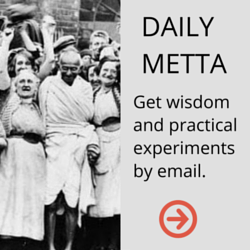March 29:
 “For one who follows this doctrine [Ahimsa] there is no room for an enemy.”
“For one who follows this doctrine [Ahimsa] there is no room for an enemy.”
–Gandhi (February 16, 1916, Selected Writings, pp. 377-390)
In the classic Indian epic The Mahabharata, one of the heroes, Yuddhisthira, has the epithet Ajatashatru, meaning, “he who has no enemies.” After his death, he arrives in heaven. The inevitable question arises, how could you, a person who is “steadfast in battle” (the meaning of Yuddhisthira) not have enemies? There are thousands of Kauravas lying dead down there who tried to kill you. He replies, “They may have hated me, but I never hated them.”
Ahimsa, the negation of the desire or intent to harm in its literal meaning, is no piece of cake. It takes vigilance and courage. Gandhi maintains that even if someone sees us an enemy, we need not respond in kind. In nonviolence, everyone does not need to be your best friend, but that does not mean we need leave room in our hearts for the category of ‘enemy’, either — unless it applies to our own hatred. When we turn the war metaphor inward to signify the battle in oneself, much in the spirit of Gandhi’s interpretation of the Gita, there need be no irony in a person who is ‘steadfast in battle’ and a ‘person who has no enemies.’
Experiment in Nonviolence:
Consider some practical ways to challenge one’s own “enemy” category.
 Daily Metta 2015, a service of the Metta Center for Nonviolence, is a daily reflection on the strategic and spiritual insights of Mahatma Gandhi in thought, word and deed. As Gandhi called his life an “experiment in truth,” we have included an experiment in nonviolence to accompany each Daily Metta. Check in every day for new inspiration. Each year will be dedicated to another wisdom teacher.
Daily Metta 2015, a service of the Metta Center for Nonviolence, is a daily reflection on the strategic and spiritual insights of Mahatma Gandhi in thought, word and deed. As Gandhi called his life an “experiment in truth,” we have included an experiment in nonviolence to accompany each Daily Metta. Check in every day for new inspiration. Each year will be dedicated to another wisdom teacher.








